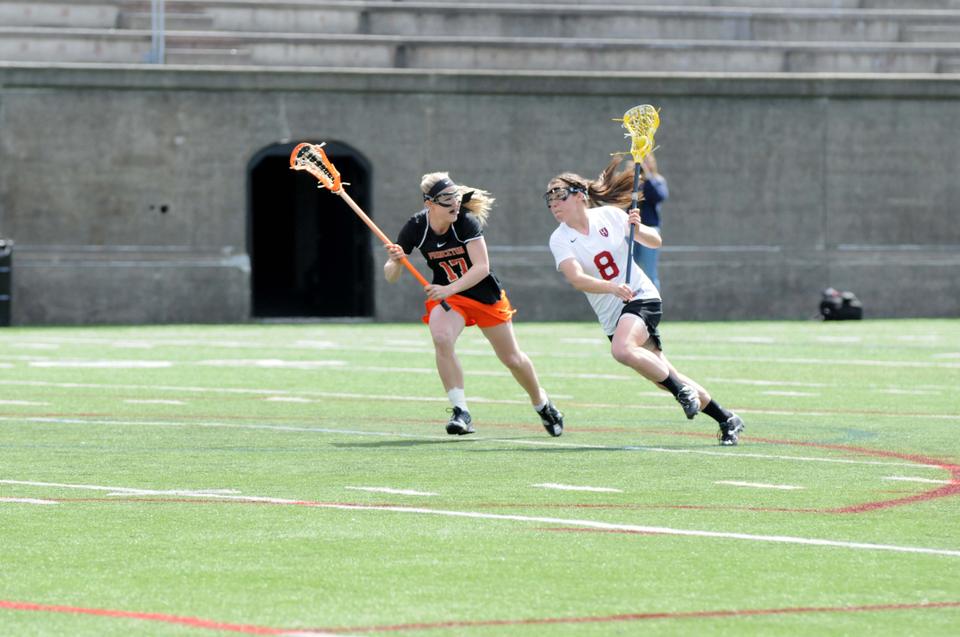
News
Cambridge Residents Slam Council Proposal to Delay Bike Lane Construction

News
‘Gender-Affirming Slay Fest’: Harvard College QSA Hosts Annual Queer Prom

News
‘Not Being Nerds’: Harvard Students Dance to Tinashe at Yardfest

News
Wrongful Death Trial Against CAMHS Employee Over 2015 Student Suicide To Begin Tuesday

News
Cornel West, Harvard Affiliates Call for University to Divest from ‘Israeli Apartheid’ at Rally
FEMALE ATHLETE OF THE YEAR: Melanie Baskind
In her final year in a Crimson uniform, Baskind shined on both the lacrosse and soccer fields

“It definitely hasn’t hit me full blast yet,” Melanie Baskind says as she sits at a table in the lobby of Quincy House wearing a crimson “Harvard Soccer” shirt and one of her three Ivy League championship rings.
It’s exactly a week after the Harvard women’s lacrosse team’s loss to Penn in the first round of the Ivy League tournament brought an end to the Crimson’s 2012 season. But the 9-5 defeat ended more than that; it also marked the end of an era.
For four years, Melanie Baskind has dominated the Ivy League.
On the lacrosse and soccer pitches, she’s played in 115 games, handed out 44 assists, and scored 115 goals. She’s served as a team captain on three occasions, won three Ivy League championships, and been named to seven All-Ivy teams.
In her four years in a Crimson uniform, Baskind has accomplished quite a bit, but her final season was the most impressive.
On the soccer field, Baskind captained Harvard to its third Ivy League championship in four years, scoring a conference-high eight goals along the way. After the season, she was unanimously voted the Ivy League Player of the Year and selected to the All-Ivy First Team for the second straight season.
But Baskind’s year didn’t end there. For the third time, Baskind—a standout three-sport athlete while at nearby Framingham High School—suited up for the women’s lacrosse team in the spring.
In her second season as women’s lacrosse captain, Baskind played a crucial role on both sides of the field for a Crimson squad that went 5-2 in the Ivy League. On the offensive end, she finished second on the team with 27 goals and first with six assists. On the defensive end, she was first on the team in caused turnovers (15), second in ground balls (37), and third in draw controls (22).
“She’s a dynamic player,” says Ellen Gleason, Baskind’s co-captain on the lacrosse team. “She’s all over the field.”
Just three years ago, though, Baskind wasn’t even sure she could make the team. After being a two-time All-American in lacrosse in high school, Baskind decided to give up the sport when she came to Harvard, choosing to focus on soccer instead.
But after her freshman year, during which she was named Ivy League Rookie of the Year in soccer, Baskind had an itch to return to the lacrosse field.
“I felt like if I didn’t try it given the fact that I had the opportunity, it was something I would always wonder [about] looking back,” she says.
After getting approval from women’s soccer coach Ray Leone, Baskind opted to give lacrosse a shot in her sophomore year.
At first, the 5’3” midfielder experienced quite a bit of uncertainty.
“I didn’t know what my stick skills would look like,” she recalls. “I didn’t even know if I would make the team.”
But it didn’t take long for her new teammates to realize she belonged.
“The second she stepped on the field we had an instant respect for her,” then-freshman Jennifer VanderMeulen told The Crimson in 2010.
Baskind made it clear why in her first lacrosse campaign. The sophomore started every game for the Crimson, finishing second on the team in scoring and first in ground balls and caused turnovers. After the season, she transitioned back into soccer mode, getting into shape for the start of the fall season, a process she repeated her junior and senior years.
But when the Harvard women’s soccer team returns to Cambridge this coming August, Baskind—for the first time in four years—will be far away.
“It’s really hard to come to terms with,” she says. “I definitely haven’t done it yet. I’m not sure when it will hit me. I’m a little scared for when it does.”
Not only will she be far from Cambridge, Baskind will be far away from the world of competitive athletics.
After graduation, the neurobiology concentrator will be spending the next year volunteering at hospitals and orphanages in Kenya and Uganda.
But Baskind won’t be completely separating herself from soccer. In fact, she will be working under the NGO Coaches Across Continents, which uses soccer to promote social change in developing countries.
“The power of soccer is huge. I’m excited to use it for different purposes,” Baskind says. “You hear about the potential to be a role model for young girls in developing countries. It’s hard to say no.”
When she returns to the United States after her year abroad, Baskind plans on attending medical school where she is thinking of specializing in pediatrics.
But she will not be completely abandoning athletics. While in Africa, she plans on climbing Mt. Kilimanjaro and is looking forward to playing in co-ed leagues when she returns to the United States.
“It will be a part of my life forever, but in a different way,” she says.
—Staff writer Martin Kessler can be reached at martin.kessler@college.harvard.edu.
Want to keep up with breaking news? Subscribe to our email newsletter.
